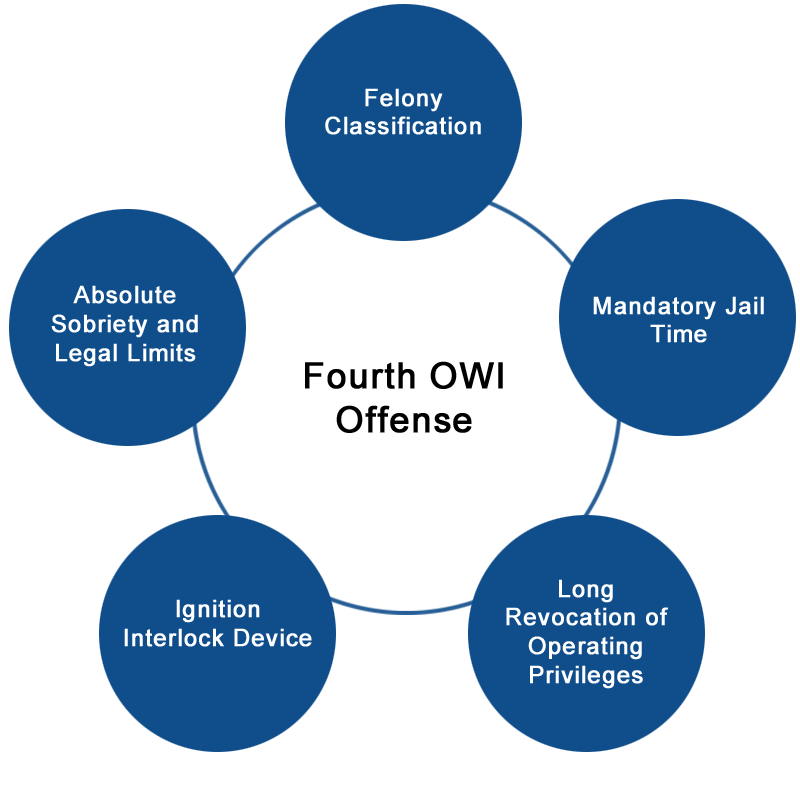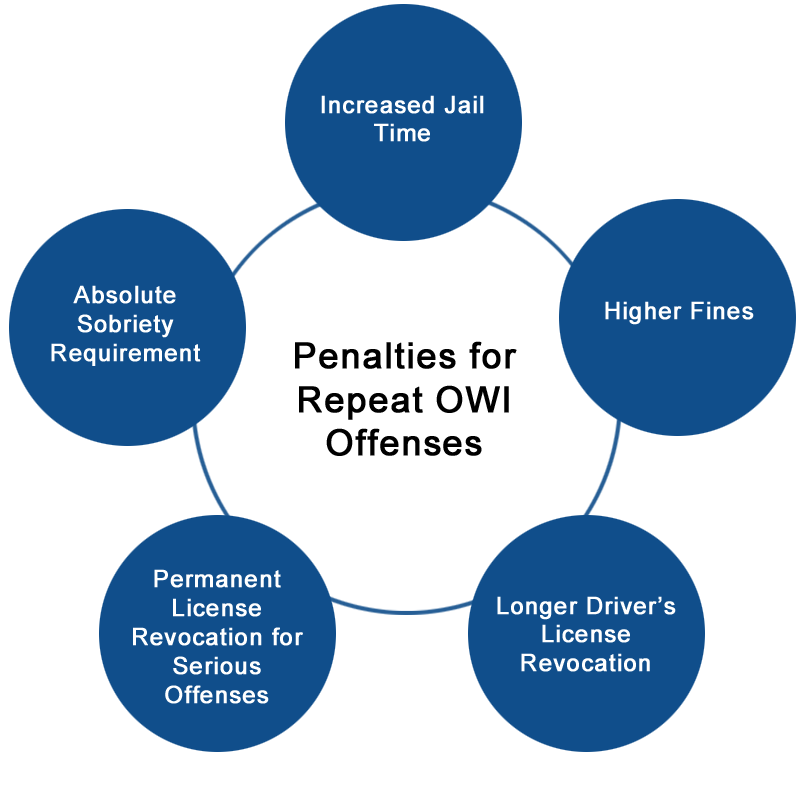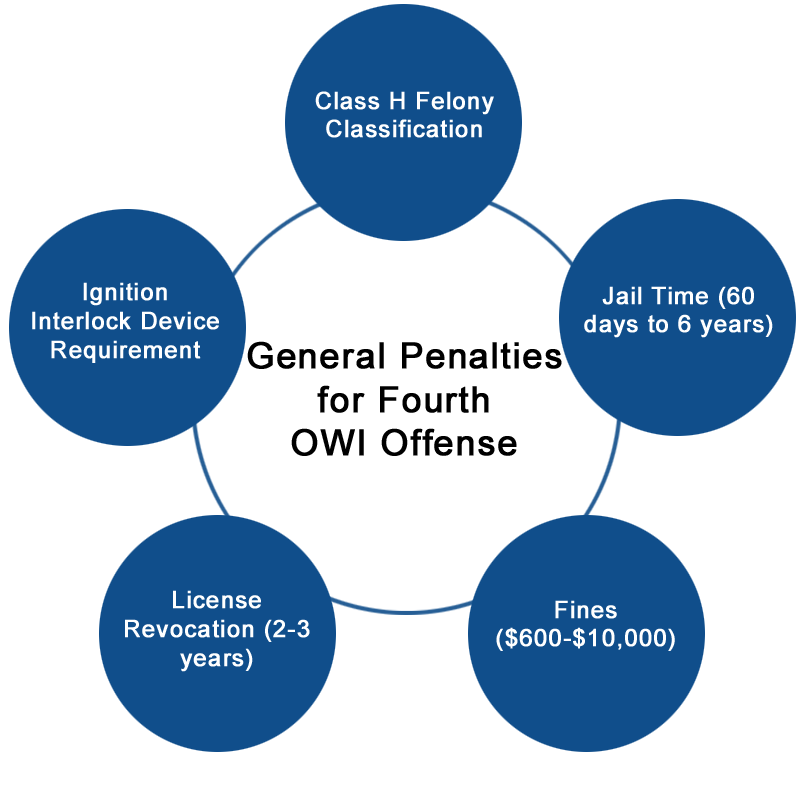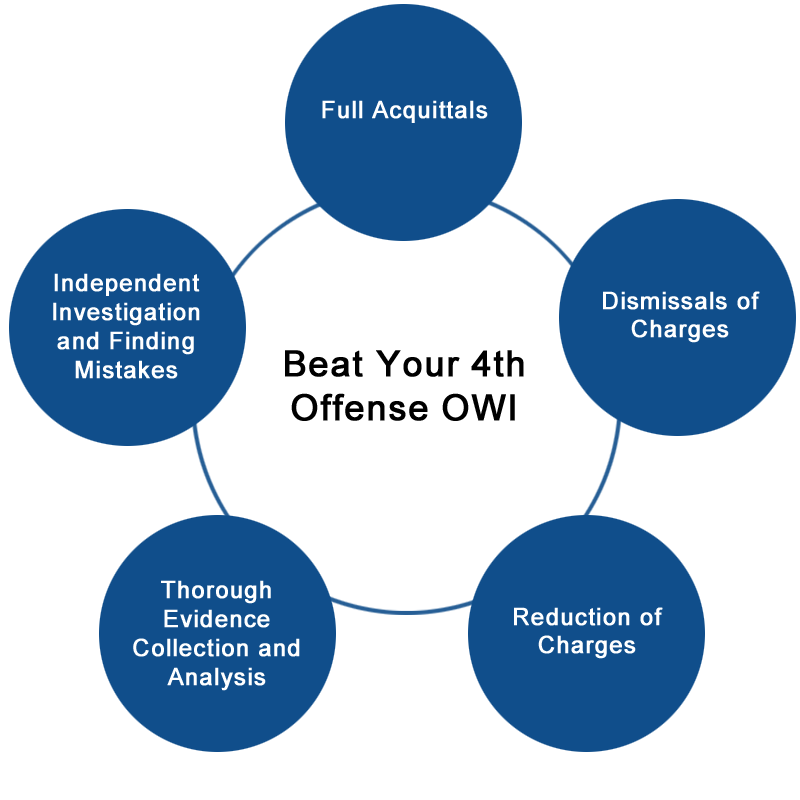
OWI Fourth Offense and More in Wisconsin
Summary: A fourth operating while intoxicated (OWI) offense is usually classified as a felony depending on many different variables. A fourth drunk-driving conviction will most certainly include mandatory jail time and a long revocation of operating privileges. Additionally, you can expect large fines, an ignition interlock device for a certain amount of time, and absolute sobriety. In Wisconsin, the concept of “Absolute Sobriety” refers to the strict requirement that certain drivers must maintain a blood alcohol concentration (BAC) of 0.00%. This means they are not allowed to have any detectable amount of alcohol in their system.
Repeat Offenders Have a 0.02% Legal Limit Threshold: In Wisconsin, individuals with prior OWI (Operating While Intoxicated) offenses often face a lower blood alcohol concentration (BAC) limit. Because reaching a BAC of 0.02% can occur after just one standard drink or less, repeat offenders must be extremely cautious. The Prohibited Alcohol Concentration (PAC) laws in Wisconsin impose a stricter BAC limit of 0.02% for those with three or more prior OWI convictions. This means that, unlike the general legal limit of 0.08% for most drivers, repeat offenders have a much lower threshold and can easily exceed it with minimal alcohol consumption.
Repeat OWI Offenses as Evidence: Many people worry about whether their past OWI convictions can be used as evidence in a new OWI charge. While your prior OWI convictions don’t determine whether you’re guilty of the new OWI, they do affect how severely you’ll be punished if you are found guilty. The more prior OWI convictions you have, the harsher the penalties will be for your current offense. This could mean longer jail time, bigger fines, and longer periods where you can’t drive.
Other Considerations for Repeat Offenders or Serious Incidents: If you have at least two serious drunk driving convictions within 25 years, along with other serious related convictions (like causing death or serious injury while driving drunk), your driver’s license will be permanently revoked.
 Driver’s License Consequences: If you get a fourth OWI/DUI within 15 years of your third one, you can potentially lose your driver’s license forever and may have to wait 10 years before you can apply for an occupational permit. If you try to get this permit after 10 years, you must complete an approved alcohol or drug assessment within 45 days and not have been convicted of any motor vehicle-related misdemeanors or felonies within that period. If your fourth OWI/DUI happens more than 15 years after your last one, you can potentially lose your driver’s license for 2-3 years.
Driver’s License Consequences: If you get a fourth OWI/DUI within 15 years of your third one, you can potentially lose your driver’s license forever and may have to wait 10 years before you can apply for an occupational permit. If you try to get this permit after 10 years, you must complete an approved alcohol or drug assessment within 45 days and not have been convicted of any motor vehicle-related misdemeanors or felonies within that period. If your fourth OWI/DUI happens more than 15 years after your last one, you can potentially lose your driver’s license for 2-3 years.
Always Challenge Your Driver’s License Suspension: In serious OWI cases, such as a 4th or subsequent offense, the attorneys at Tracey Wood and Associates take the crucial step of challenging the suspension of your driver’s license by requesting an administrative hearing. This request must be made within ten days of your OWI arrest. The administrative hearing takes place within 30 days of your breath or blood test result. An examiner from the Department of Transportation oversees the hearing. We advise all our clients to contest their suspensions and have an administrative hearing because it is our one chance to learn about the facts of the case before opposing counsel gets involved.
There are no drawbacks to this hearing, and in some cases, you don’t need to be there. If you don’t contest it, you’ll lose your license without a doubt. If you do, you have a chance to keep it. Or, worst case, we may be able to ask them to consider an occupational license for you to get to and from work to maintain your employment. We always tell our clients to go through with the hearing. Getting your license restored can be an essential factor in staying hopeful and understanding that challenging your charges is often the best way out of your situation. Often, we can prove that there is not enough evidence to justify the suspension. If we can get your license back or an occupational license, absolute sobriety may be required.
The “Absolute Sobriety Requirement” mandates that individuals with certain driving restrictions, such as those holding an occupational license due to an OWI conviction, must not have any measurable amount of alcohol in their system while operating a vehicle. This means that even a minimal amount of alcohol detected would be a violation. This rule ensures that drivers with a history of OWI offenses remain completely sober while driving, enhancing road safety.
Penalties and Consequences for a Fourth OWI Offense: A fourth offense is classified as a Class H Felony. Class H felonies, though considered lower-level felonies, still carry significant legal consequences and can greatly impact a person’s life. If found guilty of this charge, the court may sentence you to anywhere from 60 days to 6 years or longer in jail, fines ranging from $600-$10,000 or more, an alcohol assessment and sobriety program, and permanent or two-to-three-year license revocation. In addition, an Ignition Interlock Device (IID) will most likely be required for 1 to 3 years or longer. Other court-ordered penalties may include community service, probation, mandatory participation in treatment programs or counseling, and more.
Increased Jail Time for Fourth OWI Offense Due to Elevated BAC Levels: For a fourth OWI offense in Wisconsin, the jail time penalties depend on the Blood Alcohol Content (BAC) level at the time of the offense. If your BAC is between 0.02 and 0.169, you could face jail time ranging from 60 days to 6 years. If your BAC is between 0.17 and 0.199, the jail time increases significantly to between 120 days and 12 years. For a BAC between 0.20 and 0.249, you could be jailed for 180 days to 18 years. The most severe penalties apply if your BAC is 0.25 or higher, with jail time ranging from 240 days to 24 years or more.
Penalties if Children Are in the Vehicle Under 16: If you are convicted of a fourth OWI (Operating While Intoxicated) offense in Wisconsin with a child under 16 in the vehicle, the penalties are much harsher. You could be sentenced to up to 12 years in jail or longer, fined up to $20,000 or more, have your driver’s license permanently revoked or taken away for 4 to 6 years, and be required to install an Ignition Interlock Device (IID) on your vehicle for 4 to 6 years or longer.
 Additional Felony Consequences for a Fourth Offense in Wisconsin: A fourth OWI (Operating While Intoxicated) offense in Wisconsin, which is classified as a felony, results in severe consequences beyond just a harsher sentence. You will lose certain fundamental rights, such as the right to vote and the right to own firearms. Additionally, having a felony on your record can make it difficult to find a job or secure housing. A fourth OWI offense can also jeopardize custody of your children and affect your eligibility for certain professional licenses and federal assistance programs.
Additional Felony Consequences for a Fourth Offense in Wisconsin: A fourth OWI (Operating While Intoxicated) offense in Wisconsin, which is classified as a felony, results in severe consequences beyond just a harsher sentence. You will lose certain fundamental rights, such as the right to vote and the right to own firearms. Additionally, having a felony on your record can make it difficult to find a job or secure housing. A fourth OWI offense can also jeopardize custody of your children and affect your eligibility for certain professional licenses and federal assistance programs.
4th Offense OWI that Causes Injury or Death: In Wisconsin, a fourth OWI/DUI offense that results in injury or manslaughter carries severe penalties. If the offense causes great bodily harm, it is a Class F felony, with fines up to $25,000 or more and imprisonment for up to 12.5 years or longer. A Class F felony in Wisconsin is more serious than a Class H felony, carrying longer jail times, higher fines, and more severe long-term repercussions as a convicted felon.
In cases of causing death, it is classified as a Class D felony, with fines up to $100,000 or more and imprisonment for up to 25 years or longer. A Class D felony in Wisconsin is significantly more serious compared to Class H and Class F felonies, carrying longer jail times, higher fines, and more severe implications. If the driver has prior OWI-related offenses, the charge can be elevated even further to a Class C felony, leading to imprisonment for up to 40 years or more.
Safe Streets Program: Wisconsin aims to help non-violent offenders with alcohol and drug addictions achieve long-term sobriety by offering potentially reduced jail sentences for those who complete a treatment program. For a fourth OWI offense, the jail sentence can potentially be reduced if there have been no OWI convictions in the past five years. This opportunity, known as the Safe Streets Program, is available only once in a person’s lifetime and provides a crucial chance for rehabilitation and reduced penalties.
Fourth OWI Offense Cannot Be Expunged in Wisconsin: A fourth OWI (Operating While Intoxicated) offense in Wisconsin cannot be expunged from your record, meaning it will permanently impact your background checks. Therefore, challenging the charge in court is often the only way to avoid a conviction and its severe consequences.
 Preparing to Beat Your 4th Offense OWI in Wisconsin
Preparing to Beat Your 4th Offense OWI in Wisconsin
From full acquittals to dismissals and reductions of charges, Tracey Wood & Associates has achieved extremely favorable outcomes for those charged with fourth and subsequent OWI offenses in Wisconsin.
Success in court belongs to the defense team which is more thoroughly prepared than the arresting officer and prosecutor. This process starts with meticulous work, which includes collecting evidence, analyzing police reports and video footage, and conducting an independent investigation. It involves digging deeper than the opposing side, determined to find mistakes, errors, and omissions that will help you walk away from this case without a conviction.
In recent cases, Tracey Wood & Associates has had significant successes:
- • A prosecutor completely dismissed a 4th offense charge due to a lack of evidence.
- • A 4th offense with challenging circumstances was amended to lesser charges.
- • A client was acquitted of a 4th offense OWI at a jury trial where our thorough preparation made it clear that our client was not guilty.
Please read through our case wins and schedule a free, no-obligation case evaluation to learn how we can help achieve the outcome that you seek.
Featured in The Media




Call 1-888-597-3622 or Schedule a Free Case Evaluation Online


